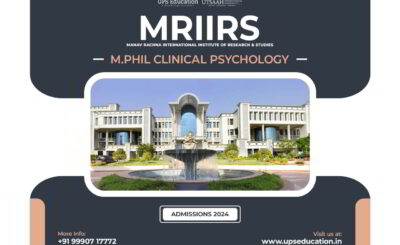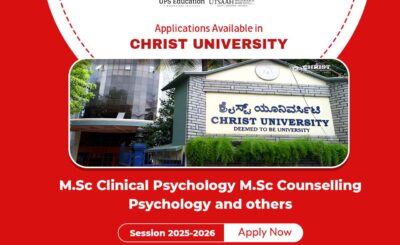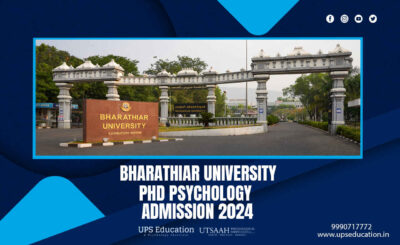![]()
Central Institute of Psychiatry (CIP) Ranchi, is one of the most prestigious institute in the field of mental health service with a journey of around 100 years. CIP is also responsible for many innovations in the field of mental health and neurosciences including clinical services, research, and manpower training in the country. CIP offers the following two courses in the field of Clinical Psychology.
Course & Seats
- Ph.D. (Clinical Psychology) – 4 seats (No Reservation)
- M. Phil (Clinical Psychology) – 16 seats (UR-08, OBC-05, SC-02, ST-01) (01-PH)
Eligibility Criteria for Applying
For Ph.D. Clinical Psychology: – M.Phil (Medical & Social Psychology/ Clinical Psychology) from any recognized University
For M.Phil Clinical Psychology: – M.A. / M.Sc. in Psychology from a UGC recognized University.
Faculties of Clinical Psychology Department
Dr. Neha Sayeed – Associate Prof. of Clinical Psychology
Ms. Prakriti Sinha – Assistant Professor of Clinical Psychology
Dr. Madhumita Bhattacharya – Assistant Professor of Clinical Psychology
Ms. Preeti Gupta – Assistant professor of Clinical Psychologist
Ms. Preeti Gupta – Assistant professor of Clinical Psychologist
Dr. Neha Sayeed – Associate Prof. of Clinical Psychology
Tentative Time of Admission
Tentatively applications for admission in CIP are released in the month of January and entrance exams is conducted in February or March.
Keep visiting our update page and our social media sites to stay updated regarding the date of entrances.
Application fee
General Candidates: ₹400/-
OBC Candidates: ₹400/-
Scheduled Caste Candidates: ₹300/-
Stipend
Selected candidates will get a stipend of ₹25,000/- per month.
How to prepare for CIP Ranchi M.Phil in Clinical Psychology Exam
Here are some tips which you can follow to Ace the Entrance Exam of CIP, Ranchi,
BOOKS The books that you can follow for M.Phil. In Clinical Psychology preparation are as below: these books are suggested by Dr Arvind Otta and taken from his Article.
- Introduction to Psychology(8th-10th Edition): Rita Atkinson and Hilgard
- Social Psychology: Baron Robert
- Theories of Personality: Hall, Lindzey, and Campbell
- Human Development: Papalia and Sally Olds (Optional – Child Development: Feldman; Nandita)
- BioPsychology: James W. Kalat. BioPsychology, Key-Points written by Dr. Arvind Otta is also very useful Book for M.Phil Clinical Psychology Entrance Examinations.
- Cognitive Psychology: Robinson-Riegler
- Statistics: Quinn McNemar / Minium
- Research Method: James Goodwin / Lewin & Fox / A. K. Singh
- Psychological Testing: Ronald Jay Cohen and Mark E. Swerdlik
- Abnormal Psychology: Sarason and Sarason / R. Comer
- Clinical Psychology: Alan Carr / Hecker and Geoffrey
- M.Phil Clinical Psychology Entrance Preparation Practice Guide written by Dr. Arvind Otta
- Latest Advancement: Follow Psychology Journal or Magazine. You also refer to Psychologs Magazine published by Utsaah Psychological Services Pvt. Ltd.
- Studying Manual can also be important so go with anyone, choose DSM or ICD. I would recommend DSM-5. (If you have studied the latest edition of Abnormal Psychology, then do not require to study classification and instead of studying classification, you can study other topics.)
You may also contact UPS Education for precise Study Materials and M.Phil Cl Psychology Entrance Coaching. Click Here to Apply Now
There books are highly recommended for preparation but covering all these pile of books is very time consuming. So one can study with the notes that they have prepared during masters, if you do not have notes then you can contact your teacher for notes.
Notes Try to prepare your own notes as it will be very useful few days before the exam. Notes should be precise and short. You can also make flowcharts and diagrams for the sake of simplicity.
Time table Prepare a time table before starting your preparation, having a time table gives you a perspective that how to go about the preparation. Make your own time table which you can follow throughout your preparation phase. Do not copy others timetable.
Revision It is important as we tend to forget the concepts that we have studied, so revision after regular interval of time becomes inevitable, you can revise the concepts once in a week. For revision purpose you can highlight the important concepts.
Mock test Attempt Regular Mock test to know your preparation level. Appearing for regular mock Test not only gives you the idea of the exam but also help you out to figure out your weak areas. And after analysing the mock test students can improve their week areas. Giving mock test also builds speed and accuracy. Mock test should be from a credible source.
Here are some of the model questions for CIP, Ranchi Entrance exam
Q1. Which of the following neurochemical systems have been implicated in the abnormal behaviours seen in patients with schizophrenia?
- Dopamine and Serotonin
- Dopamine and Glutamate
- Serotonin and Norepinephrine
- Serotonin and Oxytocin
- GABA and Glutamate
Answer:- Dopamine and Glutamate
Q2. The main advantage of a heuristic over an algorithm is that; a heuristic
- Considers every possible solution to a problem
- Involves metacognition
- Is faster than an algorithm
- Is an example of divergent thinking
Answer:- Is faster than an algorithm
Q3. Which of Piaget’s concept is most similar to the development over time of theory of mind?
- Assimilation
- Accommodation
- Object Permanence
- Conservation
- Egocentrism
Answer:- Egocentrism
Q4. In a normal distribution of IQ scores, what percentage of people has a score between 85 and 115?
- 35 Percent
- 54 Percent
- 68.26 Percent
- 79.32 Percent
- 95.44 Percent
Answer:- 68.26 Percent
Q5. According to Guilford’s model of intelligence, how many dimensions of intelligence are there?
- Three dimensions
- A variable number depending on I.Q
- 120 dimensions
- 10 dimensions
Answer:- Three dimensions
Q6. Which theory of personality emphasizes the value and importance of unconditional positive regard to relationships?
- Psychoanalytic Psychology
- Humanistic Psychology
- Cognitive Psychology
- Developmental Psychology
- Behavioral Psychology
Answer:- Humanistic Psychology
Q7. Which of the following mental disorders is characterized by pervasive instability in interpersonal behaviour, mood, and self image; frequently intense and unstable interpersonal relationships; and, often, an intense fear of abandonment?
- Narcissistic personality disorder
- Borderline personality disorder
- Antisocial personality disorder
- Histrionic personality disorder
- Schizotypal personality disorder
Answer:- Borderline personality disorder
Q8. The personality test that is used mainly as a diagnostic instrument to differentiate between normal people and those with psychiatric problems is the
- CPI
- TAT
- MMPI
- Q-technique
- 16 personality factors test
Answer:- MMPI
Q9. A researcher finds that the same individuals are rated as less attractive when they are identified as criminals than whey they are not so identified. This best illustrates
- Reactance
- The halo effect
- The mere exposure effect
- The fundamental attribution error
Answer:- The halo effect
Q10. Which of the following psychologists added a performance scale in an attempt to measure nonverbal skills and rule out other cultural or educational biases?
- Wechsler
- Binet
- Gardner
- Sternberg
- Terman
Answer:- Wechsler
These Questions are taken from Dr Arvind Otta Sir’s YouTube video titled Model Questions for M.Phil. in Clinical Psychology Entrance Exam.
For any Queries you can call us at 9990717772.
Click here to know more about CIP Ranchi Department of Psychology.
Some other important links
To know about IHBAS – Click here
To know about NIMHANS – Click here
For Complete list of RCI recognized MPhil Clinical Psychology Institute: click here









